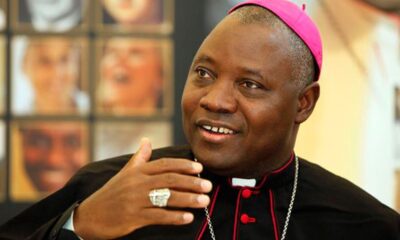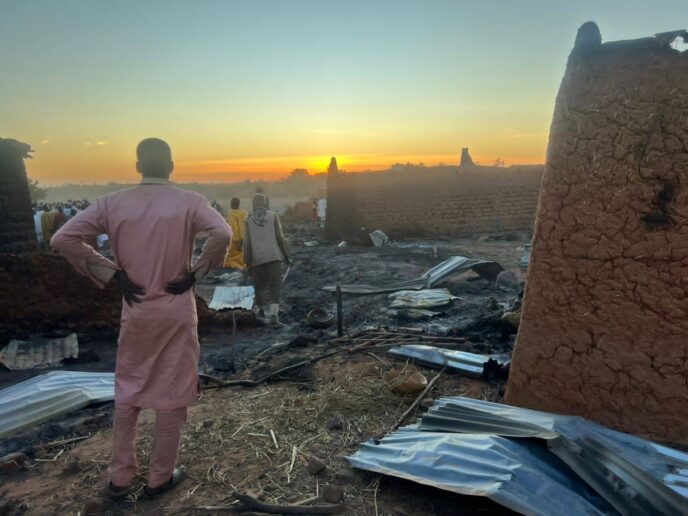Anger over the memo issued by the Minister for Humanitarian Affairs and Poverty Alleviation, Dr Betta Edu, instructing the Accountant-General of the Federation, Dr Oluwatoyin Madein, to pay N585m into the private bank account of a project accountant in her ministry, Bridget Oniyelu, spiked on Saturday, with the opposition parties calling for her sacking, and other anti-corruption crusaders calling for the probe of the transaction.
The Peoples Democratic Party (PDP), Labour Party (LP) and civil society organisations insisted on the prosecution of Edu for money laundering.
The minister had claimed that the payment was meant for vulnerable groups in Akwa Ibom, Cross River, Ogun and Lagos states.
The development is happening against the alleged laundering of N37bn by the Ministry of Humanitarian Affairs, Disaster Management and Social Development under the former minister, Sadiya Umar-Farouk.
The Economic and Financial Crimes Commission (EFCC) had arrested a contractor and also grilled several directors and ex-ministry officials in connection with the case.
The latest incident coincides with the probe of three other ministers, who served under former President Muhammadu Buhari, for graft estimated at N150bn.
The opposition parties in separate interviews (with The Punch) on Saturday, demanded the audit of the ministry from the time it was created by Buhari.
In the letter, Edu instructed the accountant-general to transfer N585,189,500 to the UBA account of one Oniyelu Bridget Mojisola.
According to the document, N219,429,750 was earmarked as “2023 grant for vulnerable groups in Akwa Ibom state;” N73,828,750 was budgeted for Cross River State; N219,462,250 for Lagos State; and N72,468,750 for Ogun State.
The minister said the payment should be deducted from the account of the National Investment Office.
The letter read, “I hereby approve the payment of the cumulative sum of N585,189,500. These are payments for programmes and activities of the Renewed Hope grant for vulnerable groups.
“This payment should be made from the National Social Investment Office account with account number: 0020208461037 to the project accountant’s details listed above.”
The Media Assistant to the Minister, Rasheed Zubair, in a statement, said that it was legal within the civil service for such payments to be made into private accounts of staff members, especially project accountants.
“Oniyelu Bridget is the Project Accountant for the GVG from the Department of Finance, and it is legal in civil service for a staff, the project accountant, to be paid and use the same funds legally and retire the same with all receipts and evidence after the project or programme is completed,” Zubair had said.
However, the AGF, Madein, said her office did not honour the request to pay N585m into a private account as directed by the minister.
The Director of Press in the OAGF, Mr Jacob Mokwa, said in a statement on Saturday that the AGF does not make payments on behalf of MDAs.
Madein stated that her office received the minister’s request as contained in a letter referenced FMHAPA/HQ/S.208 and dated December 20, 2023, but did not honour the request.
The AGF noted that payments were usually processed by the affected ministries as self-accounting entities and no bulk payment was supposed to be made to an individual’s account in the name of the project accountant.
The statement read, “The AGF explained that although her office received the said request from the ministry, it did not carry out the payment.
“The ministry was, however, advised on the appropriate steps to take in making such payments in line with the established payment procedure.
“The AGF noted that in such situations, payments are usually processed by the affected ministries as self-accounting entities and no bulk payment is supposed to be made to an individual’s account in the name of the project accountant.
“She added that such payment should be sent to the beneficiaries through their verified bank accounts.
“Dr Madein reiterated her determination to uphold the principles of accountability and transparency in the management of public finances. She advised MDAs to always ensure that the requisite steps are taken in carrying out financial transactions.”
The Deputy National Youth Leader of the PDP, Timothy Osadolor, said the recent happenings in the ministry had vindicated his party’s position.
Osadolor alleged that the All Progressives Congress-led Federal Government was corrupt and had nothing to offer Nigerians.
He said, “We have said times without numbers that this administration is very corrupt. So, what I think Nigerians should do is that all Nigerians of goodwill should come out and call for a thorough investigation into all the ministries.
“And in the same ministry, we are aware the last minister was accused of fraud. So, let’s have an overhaul of the ministry, and let’s know the reason why the Presidency is keeping the ministry unaudited for years.”
Osadolor, who wondered if the ministry was being used to launder money for the APC said, “Nigerians want to know if this is a channel for them to recoup all the money they spent in the last election. We also deserve to know if the ministry wants to be used to stash money for future elections.
“We call for a thorough investigation to unravel all these. Nigerians are hungry enough and are tired now to even start protesting.
“We are calling for the arrest of the minister; we are calling for a thorough investigation of that ministry and that investigation shouldn’t just start now.
“I’m sure the file she (Edu) stumbled upon gave her the courage to do what she’s doing now. So, let’s extend the investigation to the tenure of President Muhammad Buhari. Nigerians deserve the truth.”
On his part, LP’s National Publicity Secretary, Obiora Ifoh, alleged that the ministry was created as a conduit to divert public funds.
He said, “The ministry was created ab initio to scam Nigeria and Nigerians. We shouted about all that happened in that ministry under the watchful eyes of the then President, Muhammadu Buhari, and at the end of the day we found out that it was a monumental looting of the nation’s treasury since they created the ministry.
“The ministry was created to benefit the APC individuals. It was used for election and we knew what happened. Now under this government, they have just up the ante and you can see in the last week the revelations that have been coming out that the minister herself is working for some powerful entities in the government.
“We are not just calling for the minister’s arrest; we want the ministry to be scrapped because it serves a purpose for just a few Nigerians.
“They should be investigated; we have always said this. The investigation should start from the former minister to the present minister.
“And this present minister, if the money is truly found in a private account, should be with the EFCC explaining by now and everyone under that ministry who has a hand in the looting or the diversion of public funds should be made to account for such.”
Weighing in, the Country Director, Accountability Lab Nigeria, Friday Odeh, condemned the transfer of the funds to personal accounts, noting that it violated Chapter 7, page 713 of the Federal Government’s Financial Regulation, which prohibited government officials from transferring public funds to private accounts or vice versa.
He also stated that the EFCC and the Central Bank of Nigeria should flag the personal accounts that receive more money than usual, adding, however, that political and business influences prevented the functionality of banking regulations.
“The Federal Government’s Financial Regulation Chapter 7, page 713 talks about personal monies shall in no circumstances be paid into a government bank account, nor shall any public money be paid into a private bank account.
“An officer, who pays public money into a private bank account, is deemed to have done so with fraudulent intention. So, it is clearly stated in the Federal Government’s Financial Regulation. Public and private monies should be kept separate.
“So, it is illegal for this kind of situation. The sad part of it is one would assume that the procurement officers or the Perm Sec would be responsible for signing such transactions, but this was directly signed by the minister, which is outright wrong.”
Odeh demanded the sacking or resignation of the minister.
“We are calling not just for the sack or for the resignation of the minister, but also to keep citizens informed on how they should be engaged in all these processes” , the activist added.
On his part, the Head, National Coordinating Secretariat of the United Action Front of Civil Societies of Nigeria, Olawale Okunniyi, noted that corruption would continue to thrive whether the minister was prosecuted or not due to the system operating in the public sector.
He noted, “Pilfering is made possible by the kind of structure we run in Nigeria; very opulent presidential system that we run and it is corrupt. That is further enabled by the constitution that is corrupt and is foisted on the Nigerian people.
“Well, even if you sack her, even if you reprimand her, or you prosecute her, the cartel will protect her, and it will not stop anything because the only thing that can thrive in Nigeria today is corruption.
“Nothing good can thrive under the current system because the foundation of the country, which is the constitution, and the economic and political system is faulty.”
Adegoke Rasheed, SAN, said a separate account ought to have been created for the project being a government programme.
He said, “For accountability’s sake, it is not appropriate to make such a payment into an individual account. Even if they have the best of intentions, accountability requires the right thing must be done. It is very wrong. They have a huge task to prove to Nigerians that there is no intention to embezzle or misappropriate the fund.
“The fact that an order was made for the money to be paid into a private account raises a red flag. There should be an account opened for the project. Don’t forget the ministry has been enmeshed in controversy due to the activities of the last administration.”
The Chairman, Centre for Accountability and Open Leadership, Debo Adeniran, said he had faith in the administration of President Bola Tinubu to take disciplinary actions against the minister if she was found guilty of contravening any regulations of her public office.
A lawyer, Udochukwu Onoh, called for the immediate sacking of the former APC women leader.
The Chancellor of the International Society for Social Justice and Human Rights, Mr Jackson Omenazu, argued that Edu’s action was a complete breach of the law.
The Executive Director, Civil Society Legislative Advocacy Centre, Auwal Rafsanjani, said, “We are not surprised because like we said before, since Bola Tinubu does not have any agenda for anti-corruption, it is not surprising that he may have corrupt people in his cabinet. What many of them are doing is that they procured the appointments, and just like a business, they want to recover the money, but at the expense of the public.
“We have warned that Tinubu must not appoint people with corrupt tendencies into his government and since he didn’t listen to the advice, we are not surprised to see this happening within six months, but this must be investigated, and the needful must be done as soon as possible.”
The Deputy Executive Director of the Socio-Economic Rights and Accountability Project, Kolawole Oluwadare, stated that focus should not be on whether or not the fund was sent to a private or public account, but to ascertain if it was used for its intended purpose.
He added that there was a need to investigate if there were existing procedures and processes guiding disbursement of public funds and if the funds disbursed were in accordance with extant laws, noting that the procedures for spending public funds should be more stringent.
According to him, it is important for the Federal Government to further investigate how the fund was spent and ensure accountability with a paper trail indicating how the money left the coffers of the government to private accounts.
Oluwadare also urged that the beneficiaries should be made known as a means of transparency to the public, stressing that the law enforcement agencies could only arrest and prosecute the minister and any other person found culpable only after the completion of investigation on the matter.
He said, “The issue is not whether this account is private or not. It is whether some procedures and processes guide the disbursements of public funds and whether the disbursements in this instance are done accordingly. If they are not, perhaps it means there should be a scrutiny of those processes. Can we also look at the processes of how the funds are paid? Does it breach any known processes? Is it covered in the Procurement Act? Those are the necessary questions.
“Our opinion is not as important as the procedures of the government because I heard that this is going on in other ministries as well and what that means is that the procedures for sending public funds should be more stringent to make sure that processes that won’t make it possible in the hands of private individuals. Apart from the fact that those funds were paid to an individual account, we need to trace how those funds were spent. It is very important at this point. There should be a paper trail up to the point where the money supposedly left the government coffers in a private account. There should be an accountability process on how the funds were spent.
“The issue will rest on whether there is any breach of any procurement process and if there is, ordinarily people will be responsible. I think that should be the first step. Procurement processes, including the Procurement Act and other directives of the Bureau of Public Procurement, are what I think are important at this point. We should know if there are specifics and how it contravenes the regulations and directives of the Bureau of Public Procurement. It is that one that will determine who will be culpable to that extent.
“SERAP has been at the forefront of this for several years even during the Buhari administration to ensure that the funds disbursed via the Ministry of Humanitarian Affairs are transparent and accountable by way of returns explaining how those funds were spent. So, whether they were sent to private or public accounts, the Ministry of Humanitarian Affairs and every government agency involved must be part of the social mechanism of the Nigerian government to account for how the funds were spent and who the beneficiaries were. There should be a paper trail to tell that those funds ended up in the hands of the people who needed them. This is more important than the procedure by which it was done.
“An arrest is usually done by law enforcement agencies after investigation even though in Nigeria they arrest people to aid investigation. You can only arrest after investigation or if there is a suspicion of a person investigated not being available by any obstacle. But the thing is it is an investigation that will precede arrest and it is what will determine whether the minister or any public officer is culpable; so, an investigation is the right way to start and determine whether the issue has been going on for a while and in line with the Procurement Act.”
Commenting on the matter, the Executive Director of the Centre for Anti-Corruption and Open Leadership, Debo Adeniran, called on the anti-corruption agencies to check if the minister followed due process in transferring the fund from a public account to a private account.
He said, “I am not familiar with any procedure that allows government officials to transfer money from a public account to a private account. But they have been defending it that they followed due process. The due process has not been spelt out in a way that the rest of us will understand. Until that is done and the due process is tested under the law, we will still not accept that they have done the right thing.
“That is why we asked the anti-corruption agencies, including the EFCC and the ICPC, to look at the reasons behind the transfer, who are the beneficiaries and what advantage accrued by transferring such a humongous amount from public coffers to private coffers. So, the minister has to answer all of these questions.
“Like the former minister in that ministry, if they do not submit themselves to the rule of law, they should be forced to observe due process according to the rule of law. If she does not submit herself to the anti-corruption agency that is investigating the case, then she could be arrested because she is not covered by the immunity clause in the constitution. Well, I cannot say that she should resign right away until she is proven guilty.
“There should be a way they retire whatever comes into their hands back to the accountant-general and auditor-general of the federation. If the ministry plays its oversight function, it should have the record of the beneficiaries. Suppose there is no clear record of where the money went, in that case, there are several cases to be answered at the level of the anti-corruption agencies and the office of the auditor-general of the federation.”
Lending his voice on the issue, a lawyer, Eze Onyekpere, said the transfer of funds from public to private accounts was against financial regulations.
He noted, “It is an infraction under financial regulations, which say you cannot pay public money into a private account. What she has attempted to do or what she has done is wrong. That reaffirms our position all through that all these lump sum amounts that they put into a budget and say are for indigent people and cash transfers are without transparency and accountability. They have always been a lot that they have been taking out a long time ago.”
He stated that there was a need for transparency by publishing the names of the beneficiaries of the funds on a website for everyone to see.
“There is a solution, which is to publish the names of everyone on the social register to be available on a website available to everyone. When you pay them, it will show and can be easily confirmed. This will be subject to monitoring by the citizens and the media. This is being used as an opportunity to steal funds. All names should be published and anyone who feels too big for his or her name not to be published should be discarded,” he added.
According to him, it is up to the minister to resign her appointment or be fired by the President.
Credit: The Punch

 BIG STORY3 days ago
BIG STORY3 days ago
 BIG STORY2 days ago
BIG STORY2 days ago
 BIG STORY3 days ago
BIG STORY3 days ago
 BIG STORY4 days ago
BIG STORY4 days ago
 BIG STORY3 days ago
BIG STORY3 days ago
 BIG STORY4 days ago
BIG STORY4 days ago
 BIG STORY2 days ago
BIG STORY2 days ago
 BIG STORY4 days ago
BIG STORY4 days ago

























